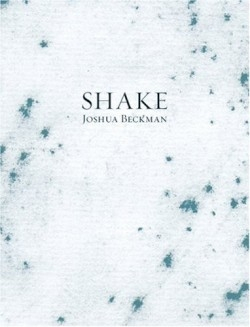Shake
For this author, the poet’s vocation is brutal, as knuckle-bloodying as any street fight. Consequently, the poems of his latest work are often chock-full of bravado, but in the end, the speaker admits his powerlessness:
Why can’t the Chevrolet seem like a swan
when that is what I want.
For a poet, whose primary weapon is his imagination, this is a fair enough question. The speaker cannot transcend his reality, which accounts for lines such as
The dead girl by the beautiful Bartlett.
I’m sad. I make horrible sentences.
Shake resonates, not with sentimentality, but with honesty. This work is as much an exploration of being knocked down as it is of getting up. And the success of Shake lies in that juxtaposition of the meanness of the world with flashes of power, kindness, and insight.
The cumulative effect of this work is enhanced by the poems’ lack of titles. Divisions are marked by stars and three section titles suggest a single-mindedness of purpose, implying perhaps that Shake is a book-length poem rather than a collection of poems. The uniformity of tone and obsessions supports such a claim. The sections are distinct, however, particularly “Let the People Die,” which contains (loosely speaking) twenty-five sonnets that use repetition of language and images to create a spell-like effect.
I like your handsome drugs. Your pleasant
drugs. Your frozen fingernails. Your painted
fingernails.
While the speaker of Shake elevates assertion over seduction, Beckman deftly maneuvers between both poetic devices.
Despite lines professing a preference of lottery-winning to jokes, humor is another tactic of these pleasingly disorienting poems. Beckman writes,
I lost my shoes, but I have my Walkman.
Underneath the humor lies a more sober situation: the poet fights against the loss of necessities and comforts himself with—what else?—art. Beckman often places seemingly incongruent objects side by side, leaving the problem of sorting out the junk up to the reader. He demands that his audience think for themselves about what is important and what is negligible. Even when the speaker makes those direct statements he prefers over seduction, some element of the equation is missing.
It is history and it is money
and it is the ugly hats the women
you’re always with wear
Any high school English teacher would surely scribble, “What is history?” in the margins, and Beckman wants his audience to ask just that.
There is an antagonistic quality to poetry that demands much from its readers. Such ferocity is hardly surprising from someone as devoted to his craft as Beckman. Shake is Beckman’s fifth book, including a 2002 collaboration with Matthew Rohrer. Among his awards, Beckman counts a 2003 Pushcart Prize alongside such recipients as heavy-hitter Louise Glück. As the title of his winning poem, “Ode to the Air Traffic Controller” suggests, Beckman deems the everyday appropriate fodder for poetry. However, Shake is not simply a report of current events; in fact, this work is more concerned with the minutiae of life, the moments that usually only matter to a handful of people. In this respect, Beckman’s poems follow the tradition of Whitman despite their contemporary tangibility. Not only do they capitalize on an American lexicon—Roosevelt High, fried chicken, junkies, and a plethora of specific place names for example—they also rely on an accumulation of sights and sounds. These poems are catalogues, offering facts rather than solutions: “No one can explain even a little of what’s going down.” A bleak sentiment, to say the least, but Beckman’s lines are also welcoming in their familiarity.
The world of Shake is not an aggrandized world; it is the real deal, one that his audience probably knows intimately. Beckman takes private moments and riffs on them until they transform into universal moments:
call from the police station stupid with your life
being treated like something you found.
It is as close as Shake comes to offering a call to arms. While his style is fast, Beckman’s effect is long lasting; it almost bullies his readers into meditation, a waking-up to their surroundings. It is a bullying couched in an awareness of and appreciation for the tradition of poetry. It is therefore a bullying well worth the sting. Beckman is Whitman’s “strong-brawn’d fighter;” his poems know how to throw a punch.
Disclosure: This article is not an endorsement, but a review. The publisher of this book provided free copies of the book to have their book reviewed by a professional reviewer. No fee was paid by the publisher for this review. Foreword Reviews only recommends books that we love. Foreword Magazine, Inc. is disclosing this in accordance with the Federal Trade Commission’s 16 CFR, Part 255.

